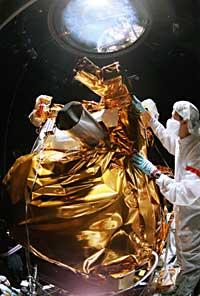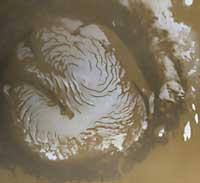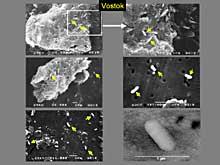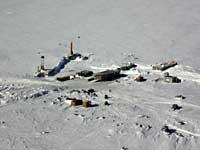Ibon de Vostok: Sterile or full of life? Strong debate under the ice

Lake Vosto, located in Antarctica, measures 14,000 km2 and in some places reaches a depth of 800 m. But more striking is that, at least in the last 15 million years, it has not received the sun. It hides under a thick layer of ice. Scientists are really interested in seeing what ecosystem there is in an area that has not had contact with the atmosphere for so long.
Arguments in favor and against life
French, Russian and American scientists began collecting ice samples on the lake in 1989. It was about detecting signs of climate change. It was not a question of looking for living things, so no samples were sterilized and then samples were not stored to avoid contamination.
Antifreezes and kerosene were used to drill the ice layer, leaving 130 m from the surface of the lake to avoid contaminating the water. At this depth, the ice is the icy water of the lake. Thus, four groups of researchers have found microorganisms in this ice, from which they have deduced that there is life in the lake.
However, the Russians do not agree at all. A Russian researcher lists the microorganisms present in the laboratory and the drilling tools, and, with the exception of three, all the microorganisms present in the sample are on this list. Thus, it has shown that the majority of microorganisms found in the icy water of the lake are introduced abroad.
Unique terrestrial sterile water

Regardless of the microorganisms present in the sample, there are more discrepancies. For example, Russian and French researchers believe that the lake is an extremely toxic environment, too toxic to life. Therefore, they are considered sterile. If so, it would be the only sterile water on Earth.
According to the theoretical calculations, from the air bubbles found in the ice layer on the lake, much oxygen has passed into the water. And since oxygen cannot escape the water, the oxygen concentration is extremely high, 50 times higher than what is normally found in the lakes.
At this concentration, oxygen is very toxic and the concentration of other compounds such as hydrogen peroxide and free radicals is also considered very high. These compounds would kill potential living beings.
Unlimited capacity of life generation
However, Americans have not accepted these calculations. According to a researcher who studied the samples, the oxygen concentration in Lake Vosto is only 10 times higher than in another lake located under the ice in Antarctica. This other lake is called Dry Valleys and seems to be full of life.

In addition, free radicals are due to radiation and ultraviolet rays, and there is no reason to claim that there are free radicals. Antioxidants are also able to withstand high concentrations of oxygen. In fact, this American researcher proposes that the search for microorganisms should focus on those who are capable of producing antioxidants.
On the other hand, he believes that the lake can be anaerobic at great depth. In many other lakes the same occurs, so microorganisms could protect themselves from excess oxygen from the upper area at the bottom of the lake. Other researchers also bet on life; if they have found life in the most isolated areas of the Earth and in the harshest areas, why should Lake Vosto be an exception?
Explorers of Ice Worlds
Perhaps all these doubts and controversies will end soon, as a Russian group plans to drill the ice to the lake in the summer 2006-2007. Another international group intends to reach the waters of the lake, for which they will take very strict measures to ensure sterility. Among other things, they want to use a self-sterilized robot.

However, the Russians have not taken into account this investigation and intend to go on their own. They want to reach the lake waters by the same hole they made to obtain the first sample. As this hole is already completely contaminated, other researchers fear that the Russians will contaminate the lake.
In addition, there is no agreement when deciding how the microorganisms present in the lake will be separated from those introduced abroad. And this is important not only for Lake Vostok. In fact, ice has been found on other planets and moons. How to look for life there without communicating it with the living beings of Earth? Evidently, the answer is a source of debate, but you will soon have to find a response, as explorers of ice worlds do not wait long.
Published in 7K.
Buletina
Bidali zure helbide elektronikoa eta jaso asteroko buletina zure sarrera-ontzian








